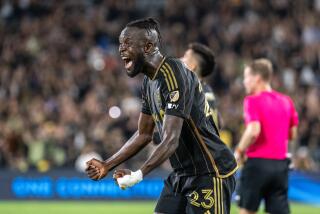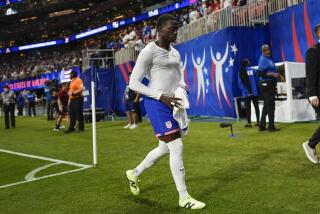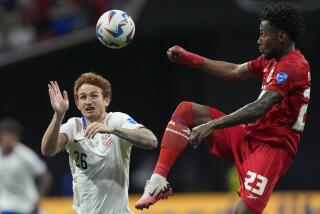Political Football : As His Soccer Stature Grows Around the World, Weah Hasn’t Forgotten About Trouble at Home in Liberia
- Share via
NEW YORK — They torched George Weah’s seaside home the other day, burning it to the ground. Before that, they flogged several of his relatives, raped two of his teenage cousins, ransacked his house and commandeered two of his 15 cars.
All because of something he had been quoted as saying in the New York Times.
No matter how famous an athlete you might be, when you cross the thugs who masquerade as warlords in the impoverished and blighted land that is Liberia, even national hero status is not enough to protect you or your family.
And in Liberia, George Oppong Weah is certainly a national hero. The first player in the history of soccer to simultaneously be named African, European and FIFA world player of the year, he is held in awe not only in Africa but in much of the world. A demigod, some have called him.
“We must give thanks first to God and then to George Weah,” Liberia’s national team coach, Wilfred “Tijani” Lardner, said when the country managed, against all odds, to qualify for the African Nations Cup in South Africa in January.
But it is Weah’s misfortune to call Monrovia, Liberia, home, even though he also maintains residences in Italy, where last season he helped AC Milan win the national championship, and here in New York, where he owns a restaurant. Today, he will play for a FIFA world all-star team against world champion Brazil across the river at Giants Stadium.
As his country’s most famous son, Weah is widely quoted, and not only on sport. But Liberia, torn by civil war, is no place these days to be heard making the sort of political remarks that Weah voiced a couple of months ago. What he told the New York Times was that he supported calls for his country to become a United Nations trusteeship.
That stance infuriated some of those fighting for control of Liberia, and, three days after the article was published, guerrillas, purportedly from the National Patriotic Front, invaded Weah’s $100,000 home--the one with the full-sized basketball court out back--looted it, doused it with gasoline and set it afire.
“I received the news from one of my cousins who was raped,” Weah, 29, told Reuters news service from Abidjan in the Ivory Coast, where he was trying to establish a temporary refuge for his family, as well as setting up a base in exile for the Liberian national team so that it could play its World Cup ’98 qualifying games in safety. “She called me up and wanted to know what I said in the New York Times.”
What Weah had told the newspaper in an interview published May 20 was, “The United Nations should come in and take over Liberia, not temporarily, but for life. To make Liberians believe in democracy, to make us believe in human rights.”
It would be easy for Weah to turn his back on his country. After all, he is financially secure and as at home in New York as in Paris or Milan. He and his American wife, Clar, have three children, the oldest a Jamaican-born daughter they adopted. But even though he holds joint Liberian-French citizenship, he can’t ignore the plight of his native land.
“I’m beginning to feel a sense of social responsibility that I didn’t feel a couple of years ago,” Weah told FIFA magazine in February. “When I look around in Liberia, I see young boys playing football all over the place. It is time Liberia established itself as a footballing nation.”
Weah is unique in having made the improbable climb from barefoot boyhood soccer on the dusty streets of Monrovia to international stardom. The journey was a long and circuitous one. A synopsis:
Born on Oct. 1, 1966, Weah passed through a succession of local teams in Liberia, none of which would ever have been heard of were it not for his subsequent fame. It was while playing as a striker for the wonderfully named Invincible Eleven, Liberia’s most popular team, that Weah began attracting wider attention.
He was signed by the powerful Cameroon club Tonnerre of Yaounde, helping it win a national title in 1988. His play caught the eye of Frenchman Claude le Roy, then Cameroon’s national team coach. Le Roy passed Weah’s name along to AS Monaco of the French first division, and Monaco’s coach, Arsene Wenger, signed Weah, then turned the promising forward into a polished diamond.
“He made me the footballer I am today,” Weah told FIFA magazine. “He taught me to persevere, to live a decent life and to play fair. He initiated me into European ways, but he understood my African origins and respected them. He let me play my game, my way.”
Weah scored 57 goals in four seasons with Monaco, powering the club to its French Cup victory in 1991 and to the final of the European Cup Winners’ Cup the following season. That was enough to prompt Paris Saint Germain to pay Monaco $4.5 million for his services. At the time, it was a record transfer fee for an African player, but Weah’s upward spiral was not about to end in the French capital.
Two more French Cup victories, in 1993 and 1995, and a French League championship in 1994, all with PSG, brought Weah widespread acclaim. His size, speed, ball-control skills and finishing ability made him one of Europe’s top marksmen. Those skills also made him a target of the wealthy clubs in the Italian League.
In 1995, after Weah had finished the season as the top scorer in the European Champions League, AC Milan made its move, buying him from PSG for $10 million. He rewarded the club last season by leading it to the Italian championship.
All the success and all the honors have not changed Weah, a devout Muslim. He has reached the pinnacle of the game but remains ambitious. He has experienced life at the top and wants to see other African players achieve the same. And he remains as outspoken as ever on perceived injustices within the game, especially in Africa.
“Officials [in Africa] want to keep African players down,” he told the British Broadcasting magazine, Focus on Africa, in April. “They are selfish, both financially and with the respect they give us.
“In Europe, if the club president drives a Ferrari, the players will also drive a Ferrari. But in Africa, if the club president drives a Mercedes, he would want the players to have a smaller car. African players get a lot of respect in Europe--you just sense it from everybody you meet. That is definitely not the case in Africa.”
Weah does more than talk a good game. He has donated thousands of dollars to a club, Junior Professionals, that he founded in Liberia and to the Liberian soccer federation itself. When Liberia was threatened with exclusion from international competition, Weah reportedly paid the country’s $7,500 FIFA and the Confederation of African Football membership dues out of his own pocket. He has also been far more than merely captain to the national team, known as the Lone Star after the country’s flag.
Lardner, Liberia’s national coach, said Weah’s actions on the field and off saved the country’s African championship campaign last January.
“It was very hard at the start. There were no funds, so it was a problem to get the players to prepare properly,” Lardner told African Soccer magazine, praising Weah, who helped by buying equipment and giving the players bonuses.
Why did Weah do it?
“I’ve never had the chance to go to a major tournament with my country,” he said at the time. “Liberia has never qualified for anything before, so I am seeking to make history for the country.”
Liberia played poorly in the African Nations Cup in South Africa and was eliminated in the first round. Weah, too, was criticized for an indifferent performance, but perhaps his goal was different. He delayed his return to Italy, angering AC Milan, to meet Nelson Mandela, South Africa’s president and a Weah hero. Apparently, the feeling was mutual.
“It is a real honor for me to welcome George,” Mandela told journalists after meeting with Weah and the Liberian team at his private home in Johannesburg. “He is the pride of Africa and indeed the entire sports world.”
A few weeks before, the sports world--or at least the soccer portion of it--had honored Weah at a glittering affair in Milan, where he accepted his award as FIFA world player of the year.
In an interview with Reuters last week, Weah said that he would like to play in MLS one day, especially for the New York/New Jersey MetroStars.
But his first love is the Lone Star.
“Liberia is my country,” he said. “Anything I can do to help the national team, the better. It’s the only good team we have. We do our best to promote a good image for our country and set an example so the politicians will lay down their arms.”
On June 2, Liberia lost to Gambia, 2-1, in its first World Cup ’98 qualifying game. Undeterred, Weah, who has put $50,000 of his money into the qualifying campaign, led his country to a 4-0 victory in the “home” leg of the series, which Liberia chose to play in Accra, Ghana.
That victory put Liberia into the next round, where it must play Egypt, Namibia and Tunisia to advance. The chances, Weah admitted long before qualifying play began, are slim.
“I have to be realistic,” he told FIFA magazine. “Liberia will probably never qualify for the World Cup. I shall never play in the world’s biggest event.”
But that should be only a small disappointment to a player who already has achieved--and continues to achieve--far more on a much broader stage.
In October, Liberia’s government issued a set of four postage stamps bearing Weah’s likeness. In announcing the event, the country’s minister for youth and sport said that Weah had shown the world that Liberians were not just “killers.”
On Wednesday, Weah will take part in a star-studded concert at San Siro Stadium in Milan, a benefit for the thousands of Liberian refugees who have fled to neighboring countries to avoid the fighting and who face severe food shortages.
It was Liberian journalist Kenneth Jackson who best summed up Weah’s value to his countrymen.
“Weah is like a flame to us,” Jackson wrote. “As long as it burns, we can forget the suffering and pain, we can dream of freedom.”
More to Read
Sign up for Essential California
The most important California stories and recommendations in your inbox every morning.
You may occasionally receive promotional content from the Los Angeles Times.













